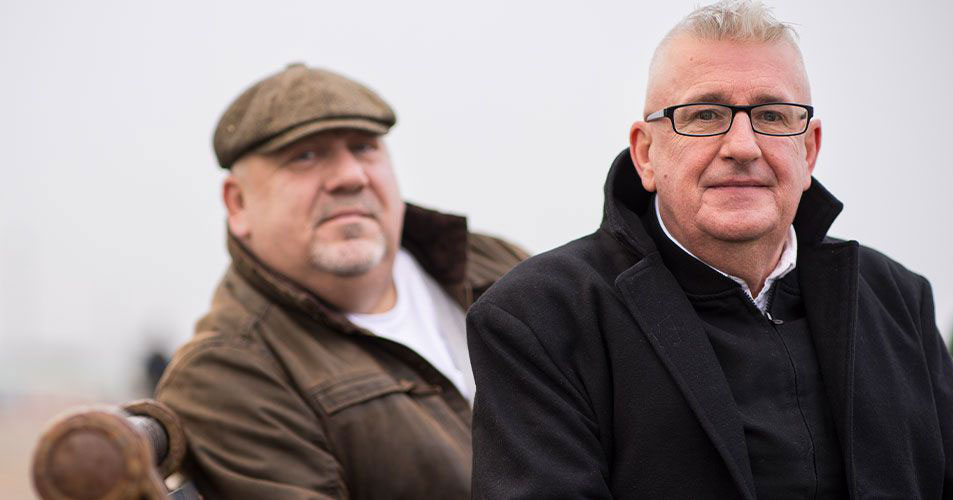Learning about a loved one’s cancer diagnosis can be devastating and many will struggle to find the support they need during this difficult time. The carer can often be overlooked, however, they need support as well as the individual battling cancer.
Maggie’s is a cancer support charity in the UK that is also growing internationally. Its new campaign ‘You Care, We Care’ shares stories about the caretakers of those with cancer. One of their ambassadors, Charles, shared his story about caring for his husband.
Charles and Martin have been together for 15 years and Martin’s cancer diagnosis came only five years into their relationship. Charles explains that it is difficult to recall what life and their relationship were like before the diagnosis.
“The reference point tends to become not when did we meet, but when did he get cancer. That’s what cancer does, it just invades everything. It changes all your plans, and how you live, and how your relationship is,” he said.
? “It’s an unbelievable isolation you have, both as someone with a diagnosis and as a carer. Not knowing where to go or who to turn to.”
We know caring for someone with cancer can be lonely. @maggiesedinburg supported Gordon and Shawn when they felt isolated ?#YouCareWeCare pic.twitter.com/skBGHYKjFY
— Maggie’s Centres (@MaggiesCentres) May 11, 2022
Charles says walking into Maggie’s was such a memorable moment for him. For the first time, he was asked how he was dealing with the diagnosis and what support he needed. The focus shifted from Martin to Charles, and he never realised how helpful that would be for their relationship.
“A person caring for someone with cancer will be tired, stressed, overwhelmed, angry and much more, but there are still a few simple things to do or keep in mind to help ease their burden,” he said.
Charles hopes to share how to support individuals who are looking after a loved one living with cancer. Below is his list of 10 ways to support carers:
- Tell them they are doing a fantastic job
- Treat them as an individual
- Be blunt when appropriate – say “you must be exhausted, give me something to do to help” – make it a closed question as they will not allow you to do anything
- Never treat them as invisible – know that they are just as vulnerable and exhausted
- Make them feel proud of what they do
- Be clear they have legal rights in terms of employment and support
- Let them be angry and negative, in fact encourage this
- Get to know the friend or family member’s illness, do not expect the carer to be the expert
- Know that they will be experiencing anxiety and depression. This should not be blanketed in terms of “you are under a lot of pressure” it should be explicit
- Never say “stay strong” or “be positive” these are the most diminishing statements of all
“Being a carer for someone with cancer can be brutal and has a huge physical and emotional burden that comes with it, and as well-meaning as it might be, when people say things like ‘stay strong’ it can make you feel even more annoyed, frustrated and even hopeless – how is it possible for you to ‘stay strong’ under the circumstances,” Charles said
As a caretaker, Charles is appreciative of those who offer their support for both him and his husband. Maggie’s has many resources to help families navigate life throughout cancer treatments. Psychologists, cancer support specialists, and benefits advisors provide free support to patients and their families.
“A cancer diagnosis sends a ripple through the whole family, but with so much focus on the person with the diagnosis, the needs of close family and friends can be forgotten. And yet, they can need just as much support as the person diagnosed. We also know that when family and friends find the support they need, there is a hugely positive impact on the person with cancer,” Chief Executive of Maggie’s, Dame Laura Lee said.
Martin recently made the difficult decision to stop his treatment to enjoy a better quality of life. The couple is enjoying the time that they have left together and living life like, ‘every day is sunny.’
Contributions to Maggie’s will help support individuals and families going through cancer treatment. Donations can be made here.
© 2022 GCN (Gay Community News). All rights reserved.
Support GCN
GCN is a free, vital resource for Ireland’s LGBTQ+ community since 1988.
GCN is a trading name of National LGBT Federation CLG, a registered charity - Charity Number: 20034580.
GCN relies on the generous support of the community and allies to sustain the crucial work that we do. Producing GCN is costly, and, in an industry which has been hugely impacted by rising costs, we need your support to help sustain and grow this vital resource.
Supporting GCN for as little as €1.99 per month will help us continue our work as Ireland’s free, independent LGBTQ+ media.
